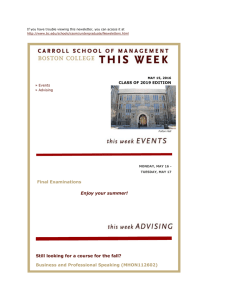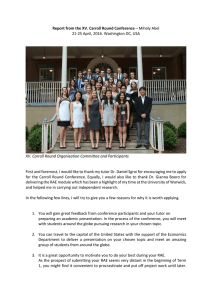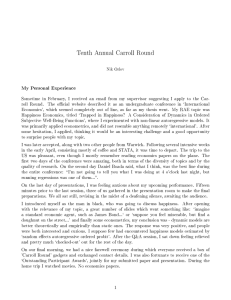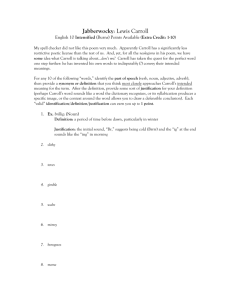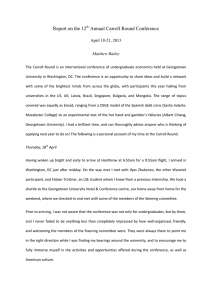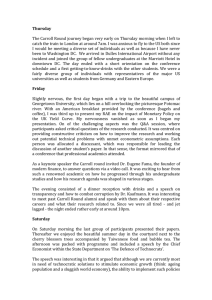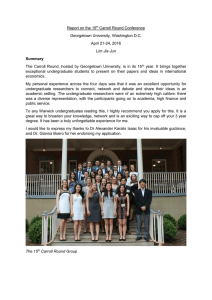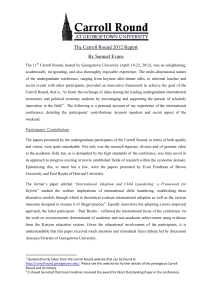An Insight into the 10 Carroll Round An insight into the 10
advertisement
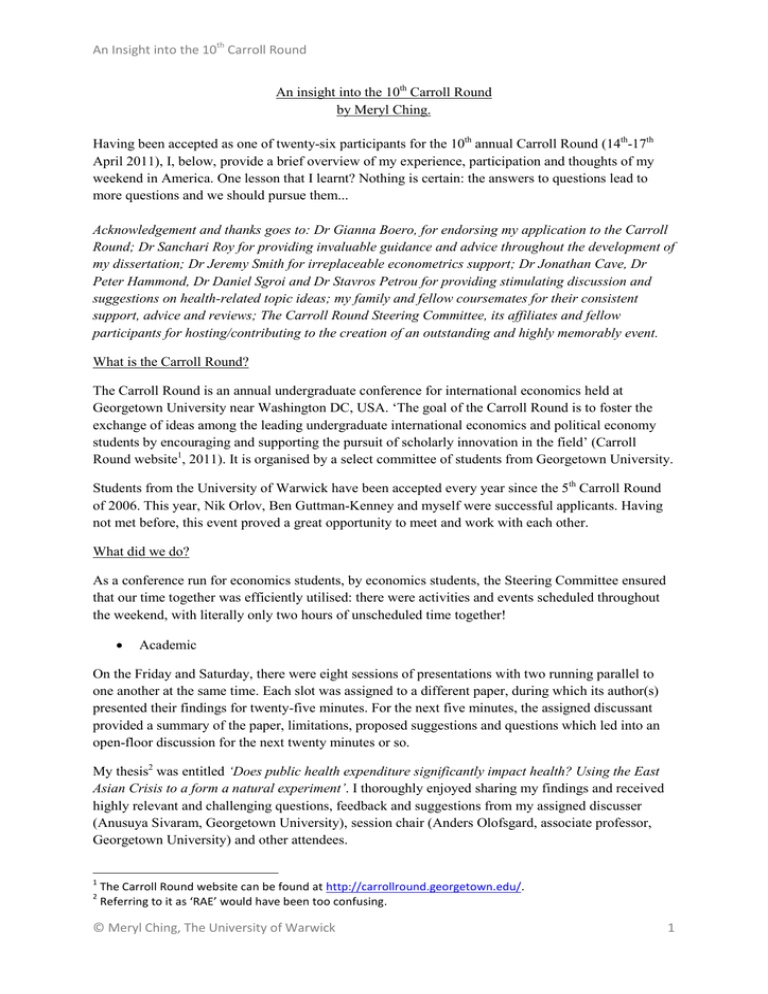
An Insight into the 10th Carroll Round An insight into the 10th Carroll Round by Meryl Ching. Having been accepted as one of twenty-six participants for the 10th annual Carroll Round (14th-17th April 2011), I, below, provide a brief overview of my experience, participation and thoughts of my weekend in America. One lesson that I learnt? Nothing is certain: the answers to questions lead to more questions and we should pursue them... Acknowledgement and thanks goes to: Dr Gianna Boero, for endorsing my application to the Carroll Round; Dr Sanchari Roy for providing invaluable guidance and advice throughout the development of my dissertation; Dr Jeremy Smith for irreplaceable econometrics support; Dr Jonathan Cave, Dr Peter Hammond, Dr Daniel Sgroi and Dr Stavros Petrou for providing stimulating discussion and suggestions on health-related topic ideas; my family and fellow coursemates for their consistent support, advice and reviews; The Carroll Round Steering Committee, its affiliates and fellow participants for hosting/contributing to the creation of an outstanding and highly memorably event. What is the Carroll Round? The Carroll Round is an annual undergraduate conference for international economics held at Georgetown University near Washington DC, USA. ‘The goal of the Carroll Round is to foster the exchange of ideas among the leading undergraduate international economics and political economy students by encouraging and supporting the pursuit of scholarly innovation in the field’ (Carroll Round website1, 2011). It is organised by a select committee of students from Georgetown University. Students from the University of Warwick have been accepted every year since the 5th Carroll Round of 2006. This year, Nik Orlov, Ben Guttman-Kenney and myself were successful applicants. Having not met before, this event proved a great opportunity to meet and work with each other. What did we do? As a conference run for economics students, by economics students, the Steering Committee ensured that our time together was efficiently utilised: there were activities and events scheduled throughout the weekend, with literally only two hours of unscheduled time together! Academic On the Friday and Saturday, there were eight sessions of presentations with two running parallel to one another at the same time. Each slot was assigned to a different paper, during which its author(s) presented their findings for twenty-five minutes. For the next five minutes, the assigned discussant provided a summary of the paper, limitations, proposed suggestions and questions which led into an open-floor discussion for the next twenty minutes or so. My thesis2 was entitled ‘Does public health expenditure significantly impact health? Using the East Asian Crisis to a form a natural experiment’. I thoroughly enjoyed sharing my findings and received highly relevant and challenging questions, feedback and suggestions from my assigned discusser (Anusuya Sivaram, Georgetown University), session chair (Anders Olofsgard, associate professor, Georgetown University) and other attendees. 1 2 The Carroll Round website can be found at http://carrollround.georgetown.edu/. Referring to it as ‘RAE’ would have been too confusing. © Meryl Ching, The University of Warwick 1 An Insight into the 10th Carroll Round Prior to this, I was also the discussant for Ben Langworthy’s interesting paper, the results of which suggested that parental migration causes an improvement in child nutrition. Having read most of his paper on the eight-hour flight to Washington further made me reflect on how I could improve my paper and make it more accessible. The other presentations that I attended were also highly impressive, far beyond my expectations and understanding! My particular favourites included: o ‘CoCo Pops: What will be the implications for a bank’s (and the financial system’s) stability of CoCos being triggered? A theoretical model of signalling and bank runs’ (Ben GuttmanKenney, Warwick University), o ‘Evidence of product differentiation in the Microfinance Industry’ (Daniel Chan, United States Naval Academy) and o ‘National Government Transfers and Household Poverty: Evidence from Argentina’ (Monica Scheid, Georgetown University). Learning about such papers provided me with a broader, global perspective of economics, the standard of undergraduate theses, and the diversity of research interests/specialism. Keynote speakers On the Friday, we had a personal evening with Prof. Joseph Stiglitz (see photo, below) at the luscious Four Seasons Hotel. We shook hands, conversed and wined and dined (in a three-course gourmet meal) with him, prior to him speaking to us for a couple of hours about his thoughts on the 2007 global financial crisis: its causes, what is being done post-event and what should be being done. On the Saturday, Prof. Jagdish Bhagwati spoke to us privately in Georgetown University’s beautiful Riggs Library. A somewhat unconventional economist with a great sense of humour, Bhagwati outlined and justified support of free trade, rather than protectionism, through specialism/comparative advantages and variation. He also emphasised how success required appropriate leadership. This was followed by a reception in the University President’s Room, with delicious canapés, when we were able to exchange intellectual thinking and banter on a more personal level with Bhagwati. Social This aspect of the conference was brilliantly organised, especially because we ate every meal together no matter where or what it was. Favourite food discovery: cheese steak. Also, on the Saturday night, we went to a snooker/pool club during which we listened to ‘The stand-up economist’, Yoram Bauman, including his well-known ‘Mankiw’s ten principles of economics, translated’. Although I may not have understood his humour all the time, it was still something different and fun to do. During the Thursday and Friday afternoons, the Committee took us on walking tours of, respectively, Washington DC to see the IMF, World Bank, Federal Reserve, WWII War Memorial and the White House, and around Georgetown to see the Potomac River, Canal and high street. The former tour also allowed us to experience the (very dark) metro and public buses. On the Sunday, the Committee included bagels with our breakfast, for which I had a deliciously calorific steak, cheese, egg and ‘everything bagel’. Being at the Mortara Center for International Studies, the Committee then drew the conference to a close, with touching presentations, awards and memorabilia, far beyond most of the participant’s expectations. © Meryl Ching, The University of Warwick 2 An Insight into the 10th Carroll Round Some reflections Theory and empirical papers are very different. Combining the comparative advantages of individuals/economists can be highly beneficial and powerful (optimisation of synergies?). We should not expect to understand everything because the world is complicated and individuals and countries are highly heterogeneous: questions lead to more questions... We should not be afraid to question things. The American education system, attitudes and the relationships between staff and students is very positive and inspirational. The Carroll Round (founded by Christopher Griffin) is an outstanding conference and opportunity for undergraduates-I would highly encourage students to apply for this! It will only improve. As highly committed advisor to the Carroll Round, Dean Mitch Kaneda deserves recognition. What next? I will investigate and incorporate some of the feedback that I received about my thesis. I will then submit this for my final RAE submission as well as to the Carroll Round Steering Committee, for publication in the 10th Carroll Round proceedings. This will be published in April 2012. I am also now part of the Carroll Round alumni. I am looking forward to finding how some of our paths might cross in the (near) future... Warwick University participants with Stiglitz. From left to right: Nik Orlov, Meryl Ching, Prof. Joseph Stiglitz and Ben Guttman-Kenney (15/04/2011) © Meryl Ching, The University of Warwick 3
